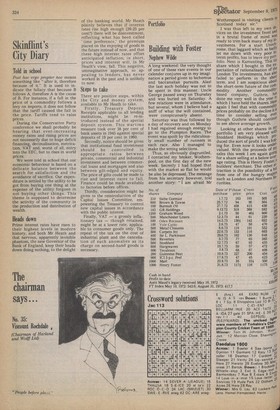Skinflint's City Diary
Told in school
Post hoc ergo propter hoe means something like "after it, therefore because of it." It is used to indicate the fallacy that because B follows A, therefore A is the cause of B. For instance, if a fall in the price of a commodity follows a levy on imports, it does not follow that the tariff caused the fall in the pride. Tariffs tend to raise prices.
During the Conservative Party conference we shall probably be hearing that ever-increasing money rates and rising prices are not necessarily due to huge deficit financing, decimalisation, metrication, VAT and, worst of all, entry into the EEC, but to rises in world prices.
We were told in school that our economic, behaviour is based on a 'delicate balance between the search for satisfaction and the avoidance of sacrifice. Our expenditure is settled by the utility to be got from buying one thing at the expense of the utility forgone in not buying other things. This theme is supposed to determine the activity of the community in the production and distribution of wealth.
Heads down
Prime interest rates have risen to their highest levels in modern history, and both Mr Heath and that nervous, apparently invisible phantom, the new Governor of the Bank of England, keep their heads down doing nothing, to the delight
of the banking world. Mr Heath plainly believes that if interest rates rise high enough (20-25 per cent?) there will be disinvestment, reflecting what has been called 'time preference,' the premium placed on the enjoying of goods in the future instead of now, and that these high interest rates offset anticipated inflation; in short, prices and interest will, in Mr Heath's view, fall. This negative, unimaginative approach, so appealing to lenders, has never worked in the past and is unlikely to now.
Steps to take
There arc positive steps, within the City and money system, available to Mr Heath to take.
Firstly, Treasury Deposit Receipts applicable to all lending institutions, might be re-introduced instead of the special deposit system. This wartime measure took over 38 per cent of bank assets in 1945 against special deposits of 19 per cent in 1960.
Secondly, notice should be given that institutional fund investment should be controlled in appropriate ratios between private, commercial and industrial investment and between commercial loans and mortgages and also between gilt-edged and equity. The price of gilts could be made to rise and interest rates to fall. Finance could be made available to factories before offices.
Thirdly, consideration might be given to the reintroduction of the Capital Issues Committee, empowering the Treasury to control new capital issues in accordance with the public interest.
Finally, VAT — a grossly inflationary tax — though retained,
might be at a lower rate, applicable to consumer goods only. The repeal of the tax on the cost of industrial plant and the cancellation of such anomalies as its charge on second-hand goods is necessary.


































 Previous page
Previous page